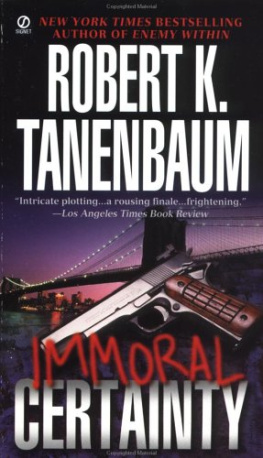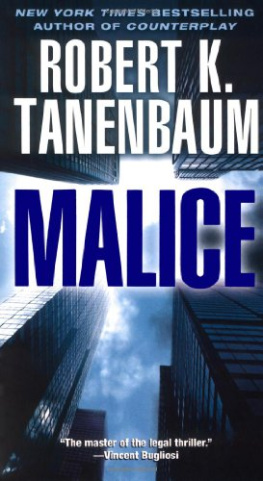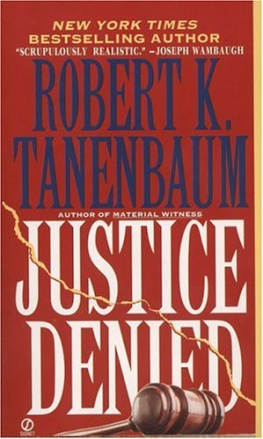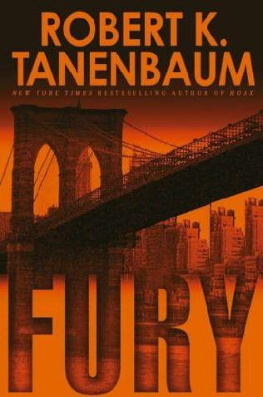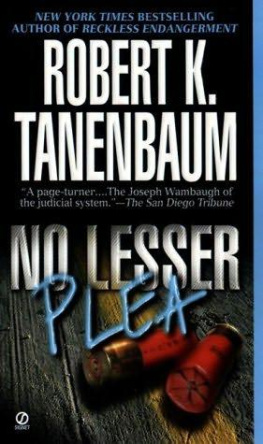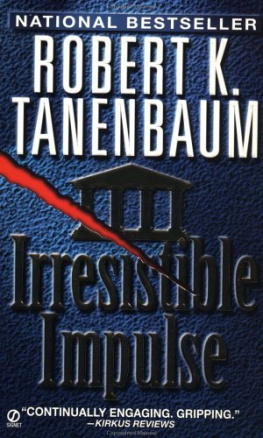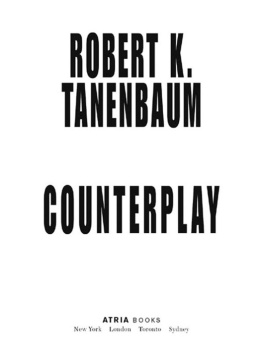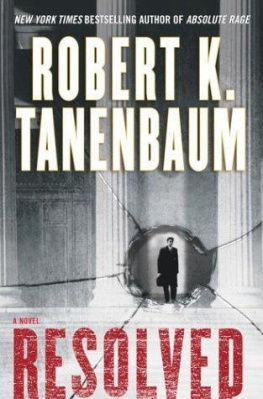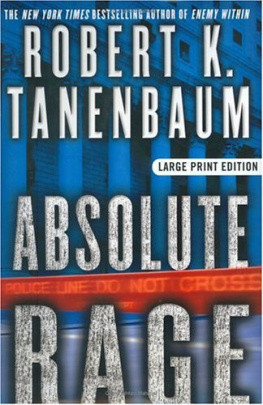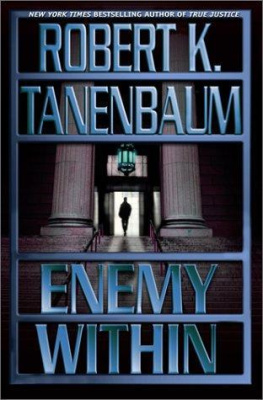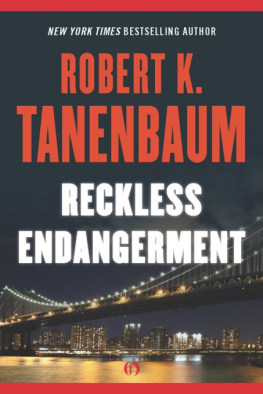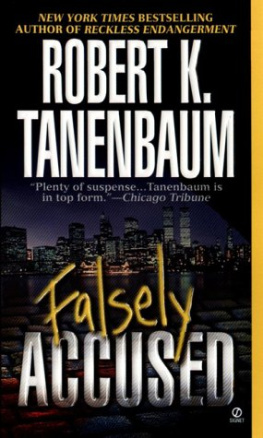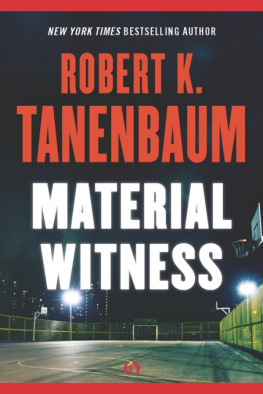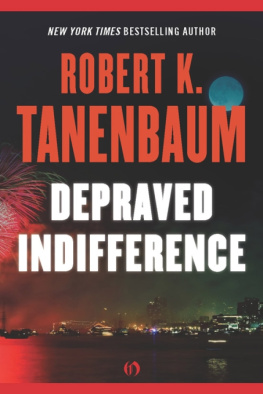Robert K. Tanenbaum - Immoral Certainty
Here you can read online Robert K. Tanenbaum - Immoral Certainty full text of the book (entire story) in english for free. Download pdf and epub, get meaning, cover and reviews about this ebook. year: 1992, publisher: Signet, genre: Detective and thriller. Description of the work, (preface) as well as reviews are available. Best literature library LitArk.com created for fans of good reading and offers a wide selection of genres:
Romance novel
Science fiction
Adventure
Detective
Science
History
Home and family
Prose
Art
Politics
Computer
Non-fiction
Religion
Business
Children
Humor
Choose a favorite category and find really read worthwhile books. Enjoy immersion in the world of imagination, feel the emotions of the characters or learn something new for yourself, make an fascinating discovery.
- Book:Immoral Certainty
- Author:
- Publisher:Signet
- Genre:
- Year:1992
- Rating:4 / 5
- Favourites:Add to favourites
- Your mark:
- 80
- 1
- 2
- 3
- 4
- 5
Immoral Certainty: summary, description and annotation
We offer to read an annotation, description, summary or preface (depends on what the author of the book "Immoral Certainty" wrote himself). If you haven't found the necessary information about the book — write in the comments, we will try to find it.
Immoral Certainty — read online for free the complete book (whole text) full work
Below is the text of the book, divided by pages. System saving the place of the last page read, allows you to conveniently read the book "Immoral Certainty" online for free, without having to search again every time where you left off. Put a bookmark, and you can go to the page where you finished reading at any time.
Font size:
Interval:
Bookmark:
CHAPTER
1
O n a damp spring night in New York City in 197-, Patrolman Russell Slayton and his partner Jim Finney of the 114th Precinct, Queens, observed a man carrying a large plastic trash bag climbing out of a second-story window. They believed that they had probable cause to stop and question the man they suspected was in process of committing a burglary.
Slayton, the senior of the two men, told Finney to pull the patrol car over and stay put, get on the radio and tell the precinct what was going on. He then got out of the car, unbuttoning the retaining strap on his pistol and fixing it so that the butt protruded from the slit in his tunic. He left his nightstick in the car and took instead a six-cell flashlight. This was not the kind of flashlight you buy in the hardware store. It was the kind policemen buy in the special little shops that cater to the law enforcement trade. It was made out of the same quality aluminum alloy used in the skin of an airliner, with a double thickness at the head and an acrylic lens thicker than the bottom of a Coke bottle. Except that it lit up, Slaytons flashlight would not have been out of place at the battle of Agincourt.
Swinging this flashlight, Slayton walked toward the man, who had by this time descended the fire escape to the street. Ten years on the force and the butterflies were still flapping around in Slaytons belly.
The man looked around and spotted Slayton and the patrol car. Slayton tensed, but to his amazement, the guy waved cordially, shouldered his trash bag and started to walk away. He even smiled; Slayton could see the flash of his white teeth.
Hey, you! Slayton shouted. The guy kept walking. Slayton clicked on his flash and caught the man in its sharp beam.
Stop right there, fella! The man turned and pointed inquiringly at his chest, a look of surprise on his face. Slayton thought later that this was the time he should have pulled his gun out, but something about the mans appearance made him hesitate. He was well-built, fairly tall, good looking, and expensively dressed in a short leather jacket and tailored slacks. His dark hair was carefully barbered, and he appeared relaxed and confident, almost jaunty. And he was white. Slayton, who was black, didnt actually think of what would happen to him if he were to shoot some rich white dude involved in some suspicious-looking but actually innocent business in this quiet middle-class neighborhood, but he was aware of the consequences at some level of his consciousness.
He therefore did not pull his gun, nor did he shout Yeah you, asshole, you see anybody else on the damn street?, which was what came first to his mind. Instead he said, Ah, sir, if you could step over here, I need to ask you a couple of questions. The guy shrugged and approached Slayton.
Sure, Officer, whats the problem?
Could I see some identification, please.
The guy put the trash bag down carefully, reached into his back pocket and brought out a wallet. He handed Slayton a Visa card and a Social Security card made out to James P. Otto.
Slayton examined the cards and handed them back.
Mr. Otto, could you tell me what you were doing climbing out of that window just now?
The guy smiled. Yeah, well, its a little embarrassing, Officer. Thats my girlfriends place. Ah, shes married to a guy whos on the road a lot. Actually, theyre in the middle of breaking up. Well, tonight we were together and he buzzes up from downstairs. He just decided to come home. A panicunbelievable! Shes got to buzz him in, right? I mean, what else could she do? So, needless to say, I get dressed and go out the window.
And whats in the bag?
Oh, thats my stuffsome shaving stuff, cologne, some clothes. Like I couldnt leave it there, you know? He laughed. Christ, I hope to hell I didnt forget anything.
Mind if I take a look?
Sure, go right ahead.
Slayton knelt down, opened the bag and shined his light in. He saw several bulky objects wrapped in towels. He pulled on the material, which came away, revealing the dull sheen of an expensive stereo tuner. He reached further into the bag, felt something cold and hauled out a silver sugar bowl. He stood up quickly then, and as he did he saw the knife, glistening, impossibly huge, rushing towards his throat.
Slayton screamed a curse and brought up his left hand to protect himself. He still held the big flashlight and this is what saved his life as the keen blade chopped through the middle joints of his first two fingers, gouged the steel case of the flashlight, and buried itself in the meat of his left shoulder. He went down on one knee bellowing for Finney. The pain from his hand was staggering; it made him sick and weak. He fought the sickness and jammed his injured hand into his armpit to staunch the gush of blood. Everything was slowing down. He heard a car door open and a shout and running feet. He felt a blow against his back and a flood of warmth on his skin there. He went down on his face as he struggled to pull his gun from its holster. Breathing hurt. His cheek touched the damp pavement and he fainted.
Finney was out of the car the instant he saw Slayton go down, without pausing to call for backup. The man was ten yards ahead of him when he passed Slaytons prostrate form, but by the end of the block he had narrowed it to five. Finney held his own six-cell flashlight in his right hand as he ran, like the baton of a relay racer, which, a scant four years ago he had in fact been at Richmond Hill High School, and on a citywide championship squad at that. He was still in pretty good shape.
The two of them crossed the deserted intersection about six feet apart. The fleeing man snapped a look over his shoulder. Finney saw his eyes widen in surprise. The man put on a burst of speed and cut sharply right, as if he were a running back shaking a tackler. This proved to be a serious error, as the cop cut inside, reached out, and clocked the man across the base of the skull with his flashlight.
It was not a heavy blow, but Finneys flashlight was the same model as Slaytons and even a tap was enough to throw the man off balance. He caromed into a street sign, stumbled, and then Finney had a hunk of leather jacket in his left hand. The big flashlight came down on the mans head once, twice. After that, Finney had no trouble handcuffing the mans wrists together around a lamppost. Then he ran back to see about his partner.
After Slayton was rushed off by ambulance, and after the seven police cars that had responded to the officer down call had dispersed, they took the burglar back to the precinct and found, unsurprisingly, that he was not James Otto. His name was Felix M. Tighe, of Jackson Heights, in Queens. A local boy. They checked his name for criminal history, and were mildly surprised to find that he had no record. They booked him for burglary, felonious assault, resisting arrest, and attempted murder. Then they patched his head and put him in a cell.
Patrolman Finney stayed at Queens County Hospital until the surgeon came out and assured him that Slayton would see the dawn. Then he drove back to the 114th to make his report. He filled in his UF 8, the summary arrest card, turned it in, and then looked up the detective who had caught the case.
The detective, a slight, tired-looking man named Howie Frie, was filling out his own form, this one a DD5 situation report. He had already tagged the two major pieces of evidencethe big bloodstained knife and the bag of swagand sent them to the lab for routine fingerprint and blood-type analysis.
Finney introduced himself as the arresting officer. Frie scowled. Oh, yeah. Hows your partner?
Hell live. His flash took some of the knife or the fucker would have sliced his head off. I never saw a blade like that before.
Yeah, its a real, what they call a bowie knife. A reproductionnot cheap either. By the way, he looked like shit when they dragged him in. Whatd you do, slap him around a little?
Next pageFont size:
Interval:
Bookmark:
Similar books «Immoral Certainty»
Look at similar books to Immoral Certainty. We have selected literature similar in name and meaning in the hope of providing readers with more options to find new, interesting, not yet read works.
Discussion, reviews of the book Immoral Certainty and just readers' own opinions. Leave your comments, write what you think about the work, its meaning or the main characters. Specify what exactly you liked and what you didn't like, and why you think so.

